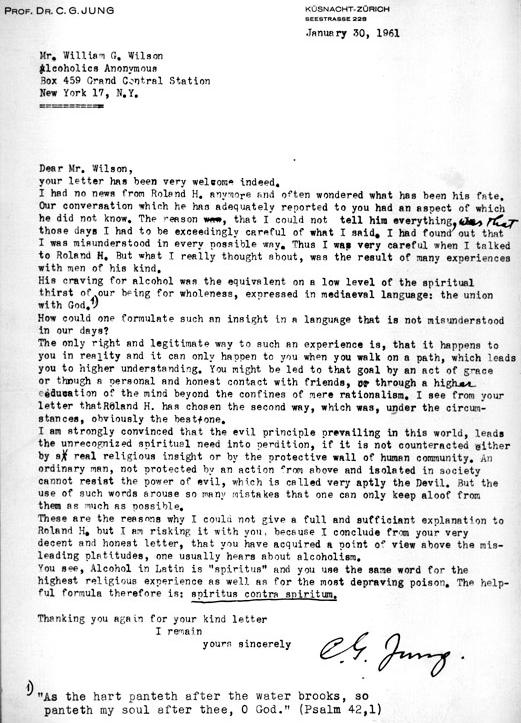 |
| Bill Wilson (1895-1971) |
Roland H., whom Jung had treated for alcoholism in or around 1932, took this important message to heart and joined the then-popular Oxford Group, and through him, Jung's remarks were carried to Ebby T. (an old drinking friend of Bill's), and on to Bill, himself. (Roland attained life-long sobriety, but remained in the Oxford Group, never becoming a member of Alcoholics Anonymous.)
The important message conveyed through Jung's treatment of Roland, set out on pages 26-28 of the 'Big Book' of Alcoholics Anonymous, contains the following description of what seems (in Jung's view) to happen to individual alcoholics who undergo profound psychological changes as a result of a spiritual (or religious) awakening:
"Ideas, emotions and attitudes which were the guiding forces of the lives of these men are suddenly cast to one side, and new conceptions and motives begin to dominate them."
 |
| Carl G. Jung (1875-1961) |
However, Jung warned: "The only right and legitimate way to such an experience (i.e., the non-dualistic union with God) is, that it happens to you in reality, and that it can only happen to you when you walk on a path which leads you to higher understanding. You might be led to that goal," he observed, "by an act of grace or through a personal and honest contact with friends, or through a higher education of the mind beyond the confines of mere rationalism."
Fortunately for the alcoholic addict, effecting a "conscious contact" with a Power greater than the limitations of our ordinary, egoic self results in "grace"; the fellowship within our A.A. (or sister) group and/or with our sponsor affords us the requisite "personal and honest human contact" we need; and, the process of continual "self-examination, meditation and prayer" we engage in provides us with "a higher education of the mind" beyond the confines of our egoic and incessant rationalism.
Here is the body of the letter from Jung to Bill W., which is also included in the Grapevine book, "The Language of the Heart." Note, Jung's ultimate prescription for alcoholism: "spritus contra spiritum".

No comments:
Post a Comment